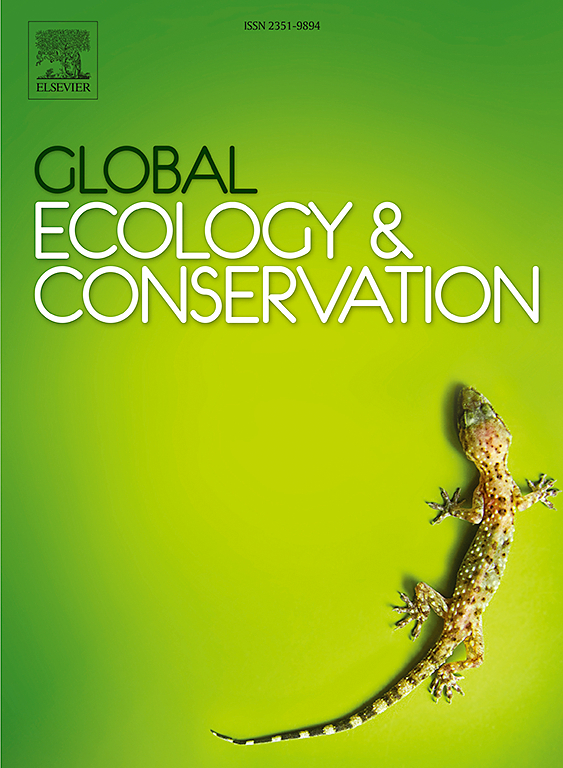Family structure influences the gut microbiota of the Sino-Mongolian beaver (Castor fiber birulai) rather than age and gender
IF 3.4
2区 环境科学与生态学
Q1 BIODIVERSITY CONSERVATION
引用次数: 0
Abstract
Gut microbiota is crucial for the health and survival of wildlife. In this study, metagenomic analysis was performed on fecal samples of endangered Sino-Mongolian beavers (Castor fiber birulai) from three groups rescued in the wild, to explore the potential factors affecting the gut microbiota of the Sino-Mongolian beaver. The results revealed that family structure is the primary factor influencing the gut microbiota of beavers (R = 0.897, P = 0.015), rather than age (R = 0.2, P = 0.135) and gender (R = −0.118, P = 0.692). This may be due to the obligate monogamy and strict family-based social structure of beavers. Meanwhile, the non-family group (solitary or couple) exhibited significantly unhealthy gut microbial composition and higher disease risk compared to the family group (parents with their offspring). Among the pathways that were significantly more abundant in non-family groups, 71 % (5 out of 7) were associated with diseases. This suggests that ensuring the family formation and size of the Sino-Mongolian beaver could maintain their homeostasis and healthy survival status, thereby better protecting this endangered subspecies.
家庭结构对汉蒙海狸肠道菌群的影响大于年龄和性别
肠道菌群对野生动物的健康和生存至关重要。本研究通过对野外抢救的三组濒危中蒙海狸(Castor fiber birulai)粪便样本进行宏基因组分析,探讨影响中蒙海狸肠道微生物群的潜在因素。结果表明,家庭结构是影响海獭肠道菌群的主要因素(R = 0.897, P = 0.015),而年龄(R = 0.2, P = 0.135)和性别(R =−0.118,P = 0.692)是影响海獭肠道菌群的主要因素。这可能是由于海狸强制性的一夫一妻制和严格的以家庭为基础的社会结构。与此同时,与家庭组(父母和子女)相比,非家庭组(独居或夫妻)表现出明显不健康的肠道微生物组成和更高的疾病风险。在非家庭群体中明显更丰富的途径中,71% %(7人中有5人)与疾病相关。由此可见,确保中蒙海狸的家庭组成和规模可以维持其体内平衡和健康的生存状态,从而更好地保护这一濒危亚种。
本文章由计算机程序翻译,如有差异,请以英文原文为准。
求助全文
约1分钟内获得全文
求助全文
来源期刊

Global Ecology and Conservation
Agricultural and Biological Sciences-Ecology, Evolution, Behavior and Systematics
CiteScore
8.10
自引率
5.00%
发文量
346
审稿时长
83 days
期刊介绍:
Global Ecology and Conservation is a peer-reviewed, open-access journal covering all sub-disciplines of ecological and conservation science: from theory to practice, from molecules to ecosystems, from regional to global. The fields covered include: organismal, population, community, and ecosystem ecology; physiological, evolutionary, and behavioral ecology; and conservation science.
 求助内容:
求助内容: 应助结果提醒方式:
应助结果提醒方式:


